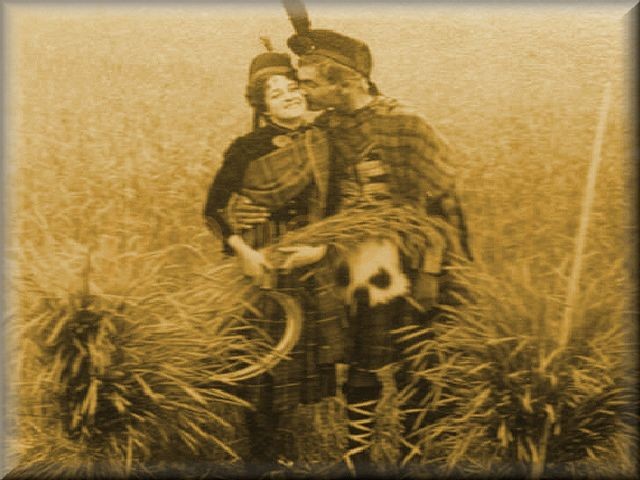“Coming Through the Rye”

 So gaily all together they sang the lively song. And Laura got up and pretended to be wading across a creek, holding her skirts above her ankles and laughing back over her shoulder, singing… — By the Shores of Silver Lake, Chapter 15, “The Last Man Out”
So gaily all together they sang the lively song. And Laura got up and pretended to be wading across a creek, holding her skirts above her ankles and laughing back over her shoulder, singing… — By the Shores of Silver Lake, Chapter 15, “The Last Man Out”
Coming Through the Rye was written by Robert Burns to an old Scottish tune, “The Miller’s Wedding.” There were many “less than polite” versions of the song in the 18th century; Burns wrote lyrics that were less bawdy. What Laura Ingalls sings in By the Shores of Silver Lake is an additional verse added by Burns at a later date. It was followed by another: “Amang the train, there is a swain I dearly lo’e mysel’, But whaur his hame, or what his name I dinna care to tell.”
Although Laura held up her skirts, pretending to wade across a creek, the rye in the song was a damp field of grain. Rye (Secale cereale) was developed as a cultivated grain crop from weeds in wheat and barley fields. It grows well in Scotland in colder and wetter conditions than other grains prefer. Rye whiskey is distilled from rye or rye and malt.
Robert Burns (1759-1796) was born near Ayr, Scotland, the son of a poor farmer. As a teenager, “Rabbie” began writing verses in Scots dialect and received recognition for his writing. He unsuccessfully labored as a farmer until circumstances (he fathered at least nine children by five different women) made him decide to move to Jamaica. In order to secure money for the trip, he published a book of his verses at Kilmarnock in 1786. It was so highly regarded that he was asked to come to Edinburgh and publish another edition of the work.
This was the turning point in Burns’ life. In Edinburgh, he was among society, riches, and learning, and both his poetry and conversational skills were much in demand. Hard work and hard drink led to health problems, however, and he died at age 37. Today, Burns is the Official Bard (poet) of Scotland, and on his January 25th birthday each year, Scots around the world celebrate with a Burns Night Supper. Mary Ingalls was such a fan of Robert Burns that at her graduation from the Iowa College for the Blind, she performed an essay on Burns, “Bide a Wee and Dinna Weary.”
(Robert Burns original)
[chorus] O Jenny’s a’weet, poor body,
Jenny’s seldom dry:
She draigl’t a’her petticoatie,
Comin thro’ the rye!
1. Comin thro’ the rye, poor body,
Comin Thro’ the rye,
She draigl’t a’her petticoatie,
Comin’ thro’ the rye.
2. Gin a body meet a body
Comin thro’ the rye,
Gin a body kiss a body,
Need a body cry?
3. Gin a body meet a body
Comin thro’ the glen,
Gin a body kiss a body,
Need the warld ken?
4. Gin a body meet a body
Comin thro’ the grain,
Gin a body kiss a body,
The thing’s a body ain.
(from By the Shores of Silver Lake)
Ilka lassie has her laddie,
Nane, they say, ha’e I,
Yet all the lads they smile at me
When coming through the Rye.
CLICK HERE to listen.
Click on the above images to view view a copy of Little House era sheet music of “Coming Through the Rye.”
This music is archived in the Lester S. Levy Collection of Sheet Music, part of Special Collections at the Milton S. Eisenhower Library of The Johns Hopkins University. The collection contains over 29,000 pieces of music and focuses on popular American music from 1780-1960.

“Coming Through the Rye” (SSL 15)
“Ilka lassie has her laddie…”





